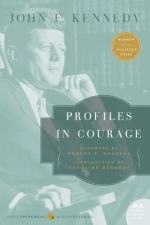
|
| Name: _________________________ | Period: ___________________ |
This test consists of 15 multiple choice questions and 5 short answer questions.
Multiple Choice Questions
1. What act of inconsistency brought his Missouri constituents to brand him a traitor?
(a) His willingness to allow the country to go to war.
(b) His voting with the Republicans.
(c) His opposition to annexting Texas.
(d) His opposition to the Missouri Compromise.
2. What was Daniel Webster known for during his lifetime?
(a) As a squeaky voiced speaker.
(b) As a particularly eloquent speaker.
(c) As a politician who opposed any kind of compromise.
(d) As a writer of fiction.
3. What did the historian Wharton say about Houston's courage as he fought against Texas' secession from the Union?
(a) No one paid any attention as Houston entered the Secessionist Convention.
(b) It took a thousand times more courage than charging up the hill at San Jacinto.
(c) Houston finally lost his courage and gave in to popular opinion.
(d) He relapsed into alcoholism and went back to the Cherokee.
4. How does Kennedy characterize the difficult position of the elected official?
(a) Walking on the moon.
(b) Walking in the difficult landscape of being elected by constituents.
(c) Not being able to care about doing a good job.
(d) Being alone in the desert.
5. Where did Benton say he's rather see the Democratic Party rather than give one inch to Mr. Van Buren?
(a) Right in the middle of the Atlantic Ocean.
(b) 50 fathoms deep into the middle of hell fire.
(c) A thousand miles north of the Mason Dixon Line.
(d) Out of politics altogether.
6. What is Kennedy's third pressure that he feels is the most damaging?
(a) Making decisions when a fellow Senator or Congressman needs to get a pet project going.
(b) Making decisions when to satisfy a constituancy will not be what is best for the nation.
(c) Making decisions when you do not have enough information to make good ones.
(d) Making decisions that will satisfy everyone in one way or another.
7. What is a constant that an elected official must understand?
(a) That once elected, the official is no longer responsible to the constituency.
(b) He or she will never hear from the constituency until election day.
(c) The media will not report anything the elected official does not want made public.
(d) He or she is under scrutiny by the constituency.
8. What was the result of Webster's courageous stand in giving the Seventh of March speech?
(a) Webster sacrificed his potential presidential run and his popularity.
(b) Webster was honored by his constituents as a man of courage.
(c) Webster would have become president but he died 2 years later.
(d) Webster changed his position of slavery to agree with Clay.
9. What is ironic about Texas secession on March 2?
(a) It was the day Houston became governor.
(b) It was Houston's brithday.
(c) It was the anniversary of Houston's election to the Senate.
(d) It was the anniversary of the battle of San Jacinto.
10. What Senator pulled a gun on Benton once?
(a) Senator William Cooper.
(b) Senator Henry Foote.
(c) Senator Aaron Burr.
(d) Senator Martin VanBuren.
11. What Webster speech in the Senate became known by the date it was given?
(a) The First of January speech.
(b) The Independence Day speech.
(c) The Seventh of March speech.
(d) The Christmas Day speech.
12. What questionable arrangement kept Webster in the Senate when he was about to resign?
(a) Webster was offered a bfribe which he nearly accepted.
(b) Webster appointed his relatives to Senate jobs.
(c) Businesses who benefited from his help paid off his debts so he could remain in the senate.
(d) Webster lied under oath in a Senate hearing.
13. Why was John Quincey Adams generally unhappy?
(a) He never felt he had accomplished enough.
(b) He never married his childhood sweetheart.
(c) He never traveled abroad.
(d) He never couold live up to his mother's expectations.
14. What metaphor does Kennedy use to describe the relationship between the elected official and the electorate?
(a) A coach-team relationship.
(b) A doctor-patient relationship.
(c) A lawyer-client relationship.
(d) A father-child relationship.
15. To what does Kennedy ascribe as half the power of Webster?
(a) His ability to make friends easily.
(b) His handsomeand commanding appearance.
(c) His political connections.
(d) His outstanding education.
Short Answer Questions
1. What was so strange about Henry Clay's enlisting Webster in his cause for compromise?
2. Why was it considered a contradiction when Houston supported temperance?
3. What were Benton's most effective weapons as a fighter?
4. What two bills did Houston support that made him unpopular in the South?
5. What metaphoric comparison does Kennedy make to John Quincey Adams' Puritanism?
|
This section contains 821 words (approx. 3 pages at 300 words per page) |

|




